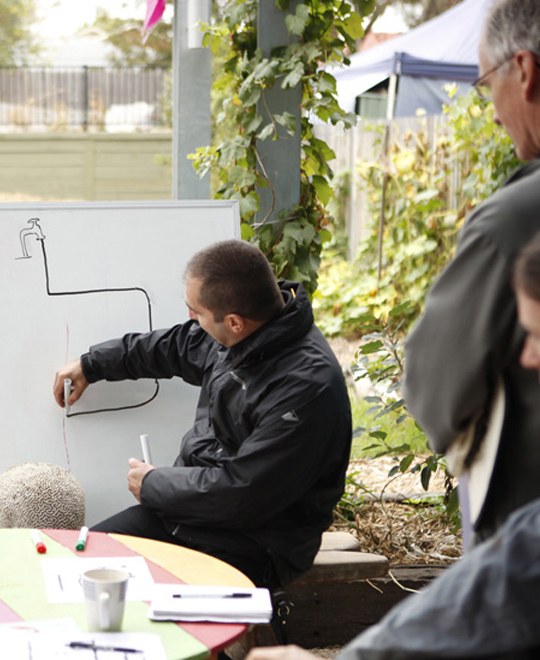Studio 6
CoHome 2
Ammon Beyerle & Heidi Lee

Studio Description
This studio considers co-housing, an alternative type of medium density housing in Melbourne. In Australia, with affordable housing and sustainability an increasingly serious problem in major cities, co-housing is an option being considered by various governments, architects, developers, co-operative organisations and bottom-up communities. Co-housing is effectively the concept of multiple households (20-30) living in a community, and sharing common spaces, services, properties and values. Arguably it is an ancient form of dwelling that is practiced worldwide.
Typically, the emphasis of co-housing is on creating an intentional community. The benefits that flow from this are ecological in the deepest sense, due to the purposeful interaction of natural, social, and personal-psychological ecologies. Regularly, it has been associated with affordability, social and public housing.
By practising an enhanced understanding of collaboration, communities, families, and individuals may scale their impact on environmental and social systems.
Studio Outcomes
Students will work on real sites in middle Melbourne suburbs, learning basic first principle site analysis, environmental design, considering Council policies, the Planning Scheme, and, the economics of a medium density housing development.
The studio will draw upon participatory design methods, strategic environmental design thinking, and, structural design in the first steps. Throughout the semester students will be inspired by meeting with locals, community activists, and experts on and off-site.
Students will develop their own medium-density housing project in detail, thinking explicitly about social relations, construction, cost, structural design, accessibility, and spatial qualities that mobilise key themes.
The final project will include group design of social and environmental systems for an entire housing development and detailed individual design of households, at a human scale.
The studio leaders will emphasise the process of framing a vision and clear principles leading to architectural concepts. Engagement with concepts of community will be implicit.
Studio Leaders
Ammon Beyerle is a registered architect and director of Here Studio, a participatory architectural practice and a network of community activists based in Melbourne and Ballarat and focused on Participatory Design of community-orientated projects, and Affordable Everyday Architecture. He brings valuable experience on complex public architectural projects.
Ammon has taught taught in architecture, landscape architecture, construction and urban design since 2005, with a focus on sustainability, adaptive reuse, and community design. He is currently completing his PhD in architecture and participation, after studying architecture and German at the University of Melbourne, (and Paris-Val-De-Seine, and Technical University Berlin).
Heidi Lee has over 15 years’ experience in educational, commercial and residential projects, designed to support good health and thriving communities.
A recognised industry leader for her role in projects such as the Zero Carbon Australia Buildings Plan and support for housing innovation through Common Equity Housing and Cohousing Australia, Heidi is an invited guest lecturer at local universities.
She brings this expertise around creating Australia’s healthiest built environments, and advancing collaboration across disciplines.
Reading & Reference
- Guattari, Félix. The Three Ecologies. Athlone Contemporary European Thinkers. London: Athlone Press, 2000 (1989). 1989.
- Hertzberger, Herman. Space and the Architect: Lessons in Architecture 2. Rotterdam: 010 Publishers, 2000.
- Meyer, Elizabeth. “Sustaining Beauty: The Performance of Appearance: A Manifesto in Three Parts “. Journal of Landscape Architecture, no. Spring (2008): 6-23.
Travel: Week 3 | $20
ST1/06 Mondays 18:15-21:15 in MSD Room 241
ST2/06 Thursdays 15:15-18:15 in MSD Room 241